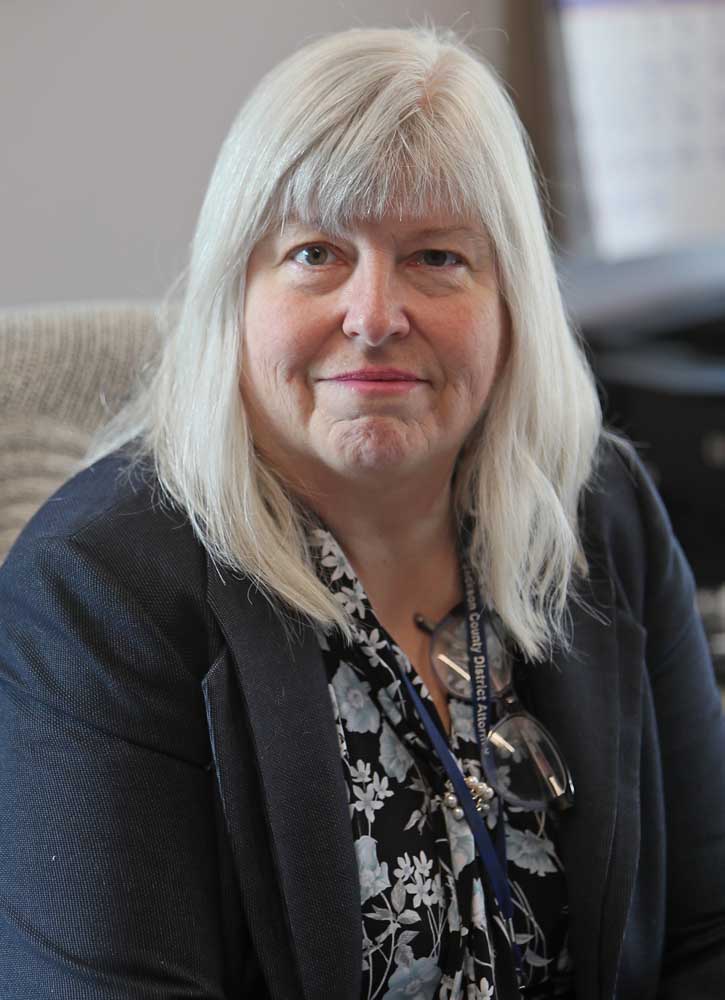Crisis in the courts: Public defender shortage threatens justice system
Published 3:30 pm Tuesday, March 28, 2023

- Jackson County District Attorney Beth Heckert said the public defender shortage seen in other parts of the state has “finally reached” the Rogue Valley.
As a Medford-based defense lawyer who has represented clients facing everything from traffic violations to murder, it’s no surprise Zachary Light believes in the presumption of innocence.
But he believes that some defendants housed in the Jackson County Jail may have to be released because there aren’t enough public defenders to represent them. And if that happens, the consequences would be devastating.
“There’s a high likelihood that that person is going to hurt somebody,” said Light, pointing to the jail across from his office on Mistletoe Street.
“Heaven forbid,” Light said. “It’s going to happen.”
Light and other public defenders in Jackson County say they cannot take on new cases or are coming close to reaching the limit. In Oregon, public defenders work under contract and are not state employees, unlike prosecutors.
Numerous Jackson County public defenders say limits on the number of cases they can take stems from the terms of their contract, drawn up by the Office of Public Defense Services, which states that the attorneys cannot “exceed 300 weighted cases per year.” The current contract is effective from July 1, 2022, through June 30, 2023.
Light expected he would meet his cap and not be able to take on new clients. “I just didn’t think it would be this early,” he said in late March.
Christine Herbert, executive director of Rogue Valley Defenders, said Light is the only public defender on her staff who has met his cap. At the time of the interview, she predicted the four other lawyers in her firm would meet their caps at the end of March or in early April.
“It creates a constitutional crisis. We saw that coming last year when we signed the contract,” Herbert said. “What will happen to all the people in the community that need lawyers, and the lawyers aren’t available to take the cases? That’s what we’re headed into right now, and we don’t really have an answer for that.”
The Office of Public Defenders did not immediately respond to a request for comment, but Jessica Kampfe, the director of the agency, recently shared her belief that lawyers can be overwhelmed even with the case limits in place.
“The caseload limits in the current public defense services contracts, while a meaningful step toward more reasonable public defense caseloads, do not always align perfectly with an individual attorney’s capacity to provide ethical representation to all their clients,” Kampfe told Oregon Public Broadcasting.
Jackson County District Attorney Beth Heckert said the public defender shortage seen in other parts of the state has “finally reached” the Rogue Valley. Heckert knows the consequences of defendants not getting attorneys. Most public defenders are court-appointed, because most defendants can’t afford to hire a lawyer.
“The whole system comes to a halt if you can’t get a public defender,” Heckert said.
In response, she said, Jackson County Circuit Court has opted to move arraignments and court appointments of some defendants to July, with the hope that by then the new public defenders contract will have gone into effect and have “reset” attorney’s case limits.
“I understand totally why the court is doing it — everyone is trying to figure out what we do about this,” Heckert said. “The concern is that this in and of itself is a coping mechanism. That’s not going to solve the problem.”
So far, judges in Jackson County have not dismissed cases due to the lack of public defenders, but it is happening elsewhere in the state.
Since February 2022, the Multnomah County Circuit Court has dismissed over 300 cases due to the public defender shortage.
Multnomah County District Attorney Mike Schmidt is not happy about it, writing in a statement on his office’s website that the dismissals have occurred over his objections.
“This sends a message to crime victims in our community that justice is unavailable and their harm will go unaddressed,” wrote Schmidt. “It also sends a message to individuals who have committed a crime that there is no accountability.”
Each week, Schmidt issues a news release stating which cases in the previous week were dismissed. Between March 17-24, one case — a first-degree theft case — was dropped. In the weeks before that, going back to the beginning of March, eight cases were dismissed.
“The public must be empowered with this information to understand the scope of this crisis,” Schmidt wrote.
Benjamin M. Bloom, Jackson County’s presiding judge, was unavailable for comment this week, but he wrote in a previous email that the public should “be assured” that public defenders are continuing to be appointed for Measure 11 and domestic violence crimes, as well as felony sex offense cases.
In Jackson County, Heckert wonders if there will be a “breaking point” for the court.
“At what point is that cut off where someone else is deciding, ‘This one isn’t as serious — and doesn’t need to go forward — as this one?’” Heckert said.
She assured the public that the crisis does not mean the Jackson County District Attorney’s Office will stop prosecuting new cases.
“The D.A. could never do that because we’d be totally unresponsive to the needs of the community if we took that stance,” Heckert said.
While Heckert has been keeping tabs on the public defender shortage, she believes the Office of Oregon Public Defenders must resolve it.
The Public Defense Services Commission, which governs that office, tried in recent weeks to address the issue by giving attorneys the ability to take on more cases if they are able, which could increase their hourly rates.
During a March 16 meeting, the commission approved a temporary policy that includes waiving the cap as long as the new cases meet the Office of Oregon Public Defenders’ criteria. These include whether the case is considered “extraordinary,” and whether it is likely to go to trial. OPDS must approve all increased hourly rates and adjustments, according to the temporary policy.
But Doug Engle, executive director of Southern Oregon Public Defenders, the largest public defenders firm in the Rogue Valley, is not optimistic the commission’s recent decision will help.
“It remains to be seen whether lawyers who have taken 12 months worth of work in eight months to try to please OPDS will then turn around and say, ‘Yeah, I’m ready to take on more,’” Engle said. “I don’t think they will.”
Engle has kept a finger on the pulse of the issue with the valley’s other two firms, Rogue Valley Defenders and Los Abogados, and believes they feel the same way he does.
“The reaction here and from the consortiums is they would probably not be interested in (taking on new cases),” Engle said.
In terms of his current clients, Light said he is “all in.”
“I’m not going to have to let anybody go, but I am just not going to be inviting anyone to the party,” he said.
Light wants people in the Rogue Valley to know public defenders are not “the deep sea monsters” of the legal profession, and that having them in place has an impact on everyone.
“The reality is, we’re a true partner of the criminal justice system, and if you don’t have us to ensure that people’s constitutional rights are preserved, they’re going to be released with nothing,” Light said. “That’s a community safety issue.”
“What will happen to all the people in the community that need lawyers, and the lawyers aren’t available to take the cases? That’s what we’re headed into right now, and we don’t really have an answer for that.”
— Christine Herbert, executive director of Rogue Valley Defenders
“The whole system comes to a halt if you can’t get a public defender.”
— Beth Heckert, Jackson County District Attorney










